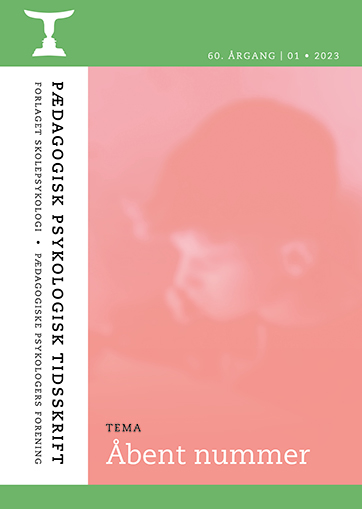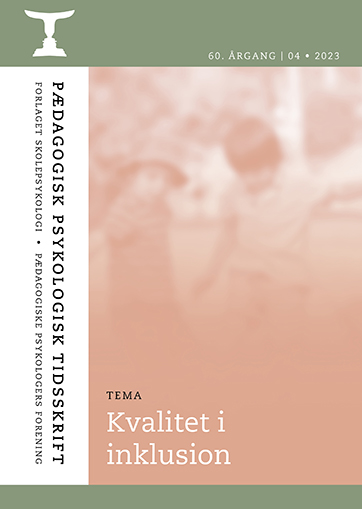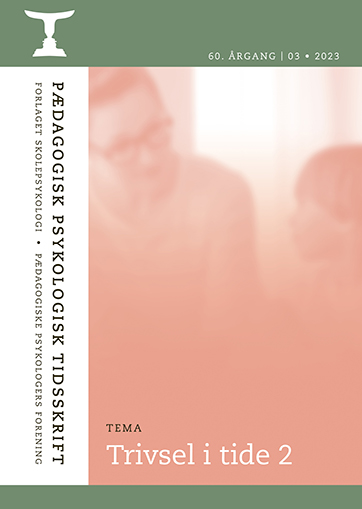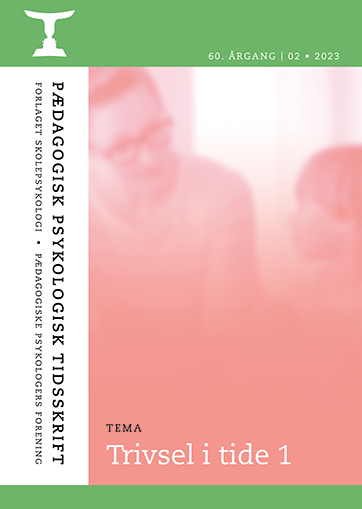Beskrivelse
Gendered premises and young people’s negotiation of sexual boundaries
By Merle Luna Raben, Emilie Espholm and Dorte Marie Søndergaard
Following the Me Too movement, there has been much debate around sexual boundaries, abuse and consent, as well as increased attention to how young people must be equipped to engage safely in their intimate and sexual relations. This ar- ticle explores young people’s experiences with and their understanding of sexual boundaries. Based on interviews with young people aged 16-21, we analyse how gendered norms offer different positionings for young people. A poststructuralist framework informs the analyses. The gendered positionings gain specific meanings in sexual encounters; as an example, boys do not appear to have the same kind of access to discourses of sexual boundaries that girls do – this being their own and those of others. This poses both challenges to the notion of consent as a shared responsibility, and it blurs the picture of who can experience sexual coercion.
Flight and parenthood – transitions as conditions for parental care after the arrival of Syrian refugees in Denmark
By Ditte Shapiro
The war in Ukraine has refuelled the interest in understanding how forced migra- tion shapes the lives of children and families. Living through war and trajectories of flight is potentially traumatising but understanding how the process of flight and rebuilding life challenge parental care is understudied. This article shows how mul- tiple transitions and ruptured social relations fundamentally change the lives of fa- milies, and thus represent difficult conditions for parental care. Based on a practice research study conducted in cooperation with five Syrian families while they were awaiting asylum and during their first year with a temporary residence permit in Denmark, the analysis explores the migratory process from a family perspective, addressing what is at stake for children and how intuitional transitions represent difficult conditions for parental care. Hence, the analysis contributes to the concep- tualisation of parental care as a social praxis related to other social praxes, which is especially relevant in working with refugee families living under hyper-precarious conditions in Denmark.
116 Pædagogisk Psykologisk Tidsskrift
Well-being as belonging and relational processes
By Jens Christian Nielsen and Helle Rabøl Hansen
The well-being of children and young people is now on the political agenda. The background is that various studies over the past 15 years have shown that an increasing proportion of young people have problems associated with their well- being. In the 2022 election campaign, the lack of well-being also became one of the themes that received the most attention. However, neither research nor political debates give us a clear picture of how we should understand (the lack of) well-being and its causes or how we can best handle and solve problems. Should we locate the problem in a performance-oriented society’s accelerating demands for young people’s purposefulness and performativity, or are we dealing with a generation of fragile young people who lack the resilience and courage to tackle the natural chal- lenges and transitions of (youth) life? Are well-being problems exacerbated by young people drawing on psychologising language or their use of social media? One arena identified both as contributing to well-being problems, e.g., through accelera- ting performance requirements, and their possible solution is the educational insti- tutions. In the past decade, annual well-being measurements have also become part of primary schools and secondary education’s task portfolio. The implementation of well-being measurements was initially intended to provide a basis for well-being initiatives. For example, they were explicitly implemented in the primary school as a tool that could potentially contribute to school and administration cooperation on well-being-promoting efforts. Despite the good intentions of monitoring well-being, few guidelines have been developed for how schools and youth education should pedagogically use the knowledge the measurements generate.
In this article, we will discuss how we can understand and approach a complex phenomenon such as young people’s well-being with a focus on its relation to their academic life.
The impact of adult-conducted play activities in relation to the participatory opportunities in children’s communities from the perspectives of primary school pupils
By Anne Bloksgaard Borg and Pernille Nielsen
The study presented in this article investigates the impact of adult-conducted play activities in relation to the participatory opportunities of primary school pupils and how these influence children’s perceptions of being included within children’s com- munities. Furthermore, the article illustrates how these play activities can contri- bute to existing work focusing on inclusion within Danish municipal primary and lower-secondary schools (den danske folkeskole). In order to obtain further know- ledge, we initially designed a play intervention, which we conducted with two classes from Danish primary schools in northern Jutland. Following this, we investigated
the impact of the play intervention from the children’s first-person perspectives. Subsequently, we supplemented these results with insights from the teachers and social educators. The article describes several examples of children who develop socio-emotional skills during the play intervention, enlarge the groups in which they play, make new friends, and expand their capacity to act.
Types of child maltreatment and their consequences
By Ask Elklit
Background: Research on child maltreatment (CM) has few longitudinal studies that combine self-report data with objective administrative data that has been col- lected continuously for decades. Objective: To give an overview of 20 studies investi- gating the impact of CM in a Danish representative sample. Participants and set- ting: From the entire 1984 Danish birth cohort, 2980 people aged 24 were randomly selected. There was an oversampling of child protection cases. Methods: The parti- cipants were interviewed by trained interviewers, and Computer Assisting Methods were used for sensitive topics. The survey data were linked to several national regi- sters using the Civil Registry Number for a series of studies on risk factors and out- comes. Linkage with parental data enabled parental risk factors before the birth to be analysed, as well as several physical, psychological, and social events during their lifetime. These factors were studied in relation to the CM classes that were identified via the survey.
Results: The maltreatment classes had several specific and shared effects on risk factors before birth, during childhood through to early adulthood. Their problems included many arenas within health, mental and social life. Conclusions: Data lin- kage studies provide an opportunity to conduct research using accurate sources of information that can be used to explore risk and protective factors. The prospective nature of this combined data facilitates temporal ordering, which strengthens the conclusions based on longer-term follow-up.
Psychological examination of multicultural children – recommendations for dilemma-filled practice
By Trine Normann Vangsbo and Janni Niclasen
This article examines the inherent dilemmas when using norm-referenced tests and psychological screening tools with multicultural children. These tools and tests often refer to national norms that do not consider migration history or different cultural backgrounds. We use two cross-cultural perspectives to illustrate different ways of using norms in a more informed practice in the context of educational psychology in Denmark.
118 Pædagogisk Psykologisk Tidsskrift
A psychologist’s reflections on interdisciplinary environmental therapeutic day treatment.
By Julie Noack Skærbæk
This article is about milieu therapy and the role of a psychologist. It is a psycholo- gist’s reflection on praxis experiences. It is argued and exemplified how milieu ther- apy is a complex praxis between people who interact and affect each other reciprocally while producing possibilities for development.
When foster parents are icebreakers for the children’s desire to learn
By Nina Madsen Sjö, Celine Lise Kragh and Charlotte Bredahl Jacobsen
The article describes a new learning intervention developed for 6-12-year-old children, tested in 8 municipalities in 2021-2022. The intervention occurred in the homes of children who had been placed in foster care and required an academic boost. The intervention’s academic content consisted of games designed to match the Ministry of Education’s academic guidelines for the subjects of Danish and Mathematics. The intervention lasted for 16 weeks, during which a minimum of 3 times a week for 20 minutes had to be play. The foster parents were taught game techniques, but also social skills and movement, which could be incorporated as part of the learning games. We evaluated the intervention with the aim of finding out whether it was meaningful and realistic to involve foster parents in an acade- mic intervention at home. Moreover, we investigated whether the intervention im- pacted the child’s wish to learn and their academic ability. The foster parents were our informants, and the quantitative evaluation showed that the children made progress and became more interested in learning as a result of participating in the learning intervention. Qualitative statements supported the foster parents’ positive experience from the intervention. Therefore, it is our assessment that we succeeded in finding an approach which creates both a change in the child, as well as a frame- work which supports foster parents in having co-responsibility for carrying out a learning intervention at home.
Talking to children about play
– Seven good tips for researchers and educators
By Pernille Strand, Astrid Lasthein Lehrmann, Andreas Lieberoth and Helle Marie Skovbjerg
Conversations with children about good or bad play experiences provide deep insights into their preferences, challenges and daily play circumstances. Methodological guidelines are, however, scarce. This article investigates what children consider good and bad play based on research interviews with children aged 6-11. We consider
how we as adults developed conversations with children about play as a specific topic and discuss when this may be pertinent to pedagogical practice. Adults can gain tremendous insights into children’s life world if they listen patiently and allow children to speak from their own perspective. Even skilled professional adults, however, tend to drive conversations with children and lead based on pedagogical agendas. Adults may also view what constitutes “good” or “bad” play very different- ly from children and for example, attribute more significance to what, on the sur- face, does not look like “nice” or “inclusive” play. However, this can result in the loss of invisible relevant knowledge of children. The article is directed at professio- nals who wish to develop conversations with children about play and better facili- tate play which takes children’s perspectives on wishes and needs into account. We conclude the article with seven recommendations for how to talk to children about play.



